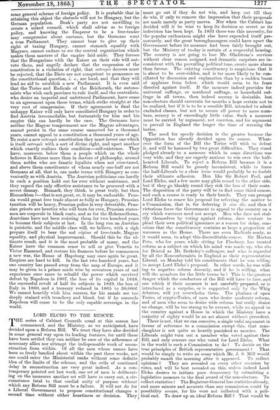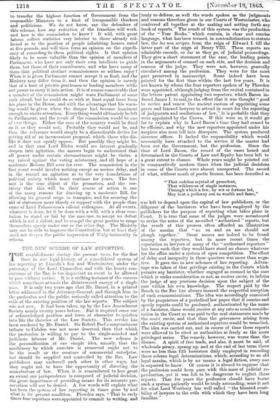LORD ELCHO TO THE RESCUE.
THE series of Cabinet Councils usual at this season has commenced, and the Ministry, as we anticipated, have decided upon a Reform Bill. We trust they have also decided in some general way upon its leading features, for until these have been settled they can neither be sure of the adherence of necessary allies nor attempt the indispensable work of recon- struction from within. Of all the men whose names have been so freely bandied about within the past three weeks, not one could enter the Ministerial ranks without some definite idea of the limits of the scheme, and the evils of continued delay in reconstruction are very great indeed. As a con- temporary pointed out last week, one set of men is deliberat- ing on the measures another set will haire to carry out, a cir- cumstance fatal to that cordial unity of purpose without which any Reform Bill must be a failure. It will not do for a Liberal Government to propose constitutional changes a second time without either heartiness or decision. They must go out if they do not win, and keep out till they do win, if only to remove the impression that their proposals are made merely as party moves. Nor when the Cabinet has decided will it be wise to keep its decision so secret as its indecision has been kept. In 1831 there was this necessity, for the popular enthusiasm might else have expended itself pre- maturely, and the great boroughmongers could have upset the Government before its measure had been fairly brought out, but the Ministry of to-day is certain of a respectful hearing. The country is not going to lose Mr. Gladstone's services without clear reason assigned, and dramatic surprises are in- consistent with the prevailing political tone, create more alarm than favour. The existing constituency is suspicious that it is about to be over-ridden, and is far more likely to be con.- ciliated by discussion and explanation than by a sudden burst of applause from below, which would seem to its fears directed against itself. If the measure indeed provides for universal suffrage, or manhood suffrage, or household suf- frage in all towns, then indeed secrecy is desirable, lest non-electors should entertain for months a hope certain not to be realized, but if it is to be a sensible Bill, intended to admit excluded classes, but not to secure all power to mere num- bers, secrecy is of exceedingly little value. Such a measure must be carried by argument, not coercion, and for argument to prevail in England the longer the time of warning the better.
The need for speedy decision is the greater because the Opposition has already decided upon its course. What- ever the form of the Bill the Tories will wish to defeat it, and will be harassed by two great difficulties. They stand pledged already to a measure which in some directions was very wide, and they are eagerly anxious to win over the half- hearted Liberals, To reject a Reform Bill because it is a Reform Bill would be grossly inconsistent, while to force the half-Liberals to a clear issue would probably be to forfeit their ultimate adhesion. Men like Sir Robert Peel, and Lord Elcho, and a few more may glide round to the other side; but if they go blankly round they risk the loss of their seats. The disposition of the party will be to find some third courser and such a course is ready to their hands. They can prompt Lord Elcho to renew his proposal for referring the matter to a Commission, that is, for deferring it sine die, and then if victorious force the Government to appeal to the country on a cry which waverers need not accept. Men who dare not stul- tify themselves by voting against reform, dare venture to plead their own political ignorance as a reason for delay, con- scious that the constituency contains as large a proportion of waverers as the House. There are even Radicals ready, as it would seem, to adopt this discreditable course. Sir Morton Peto, who for years, while sitting for Finsbury, has treated reform as a subject on which his mind was made up, who sits for Bristol as Mr. Berkeley's colleague, and who is regarded by all the Nonconformists in England as their representative Liberal, on Monday told his constituents that he was willing to accept Lord Elcho's proposal. In other words, he was will- ing to negative reform decently, and if he is willing, what will the members for the little towns be ? This is the greatest danger which the conductors of the Bill will have to face, and one which if their measure is not carefully prepared, or is introduced as a surprise, or is supported only by the Whig debaters, will yet overwhelm them. The phalanx of open, Tories, of crypto-Tories, of men who desire moderate reform; and of men who seem to desire wide reform but really desire no change, will be too strong to be overset, while an appeal to the country against a House in which the Ministry have a.
majority of eighty would be an act almost without precedent. There is not, that we can conceive, a single valid argument in favour of reference to a commission except this, that man- slaughter is not quite so heavily punished as murder. The
Liberals might turn out a member who voted against their Bill, and only censure one who voted for Lord Elcho. What
in the world is such a Commission to do ? To decide on the true principles of British representative government ? That would be simply to write an essay which Mr. J. S. Mill would probably smash the morning after it appeared. To collect opinions They are revealed on every other occasion by votes, and will be best revealed on this, unless indeed Lord Elcho desires to initiate pure democracy by submitting a
legislative measure to the final award of the non-electors. To collect statistics ? The Registrar-General has statistics already,
and more minute and accurate than any commission could by possibility secure, for his were not collected with a poli- tical end. To draw up an ideal Reform Bill ? That would be
to transfer the highest function of Government from the responsible Ministers to a knot of irresponsible thinkers and politicians. We do not know, say the defenders of this scheme, how any reduction of the franchise will work, and how is the commission to know ? It will, with great labour, collect statistics very inferior to those already col- lected as to the position of people inhabiting houses rated at five pounds, and will then form an opinion on the expedi- ency of conceding to them political rights. Is that opinion likely to be more valuable than the opinion of members of Parliament, who have not only their own intellects to guide them, but those of their constituents, and who have many of them that political instinct commissioners so seldom enjoy? When it is given Parliament cannot accept it as final, and the Ministry may differ from it, and then the opinion is merely that of a knot of private gentlemen or leading members with- out power to carry it into action. It is of course conceivable that a member of the commission might warn Parliament of some rock ahead, but he could do so with at least equal force from his place in the House, and with the advantage that his warn- ing would be given when the danger had become imminent enough to excite attention. Everything would ultimately be left to Parliament, and the result of the commission would be one of two things. Either the eyes of the country would be fixed on it, or they would not. Probably they would not be, and then the reference would simply be a discreditable device for getting rid of an inconvenient proposal, which those who dis- like it dare not openly oppose. But possibly they might be, and in that case Lord Elcho would see interest gradually deepen into agitation, the masses begin to understand that all power under certain circumstances might be theirs, a cry raised against the voting aristocracy, and all hope of a moderate Reform Bill over for ever. The commission in the first event would involve nothing except an useless delay, and in the second an agitation as to the very foundations of political society which must continue for years. The for- mer is the true object of the promoters, and the cer- tainty that this will be their course of action is one of the many reasons for drawing up a moderate Bill, for allowing its general scope to transpire, and for securing the aid of statesmen more closely en rapport with the people than some of Lord Palmerston's official colleagues. At all events, whatever is done, let it be done with a will, with a clear reso- lution to stand or fall by the measure, to accept no defeat which is not a defeat, and to compel the great parties to range themselves openly under one or the other flag. The Ministry may not be able to improve the Constitution. but at least they need not deepen the public impression of Whig insincerity in reform.































 Previous page
Previous page